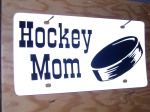 The New Oxford Dictionary has added a whole wack of new words to the dictionary this year, and while I can’t muster a tonne of enthusiasm that “bromance” and “hashtag” made the list, I am excited that moms have a new definition for our activities. This year, “hockey mom” made the list:
The New Oxford Dictionary has added a whole wack of new words to the dictionary this year, and while I can’t muster a tonne of enthusiasm that “bromance” and “hashtag” made the list, I am excited that moms have a new definition for our activities. This year, “hockey mom” made the list:
hockey mom n. informal a mother who devotes a great deal of time and effort to supporting her children’s participation in ice hockey.
Now, obviously a hockey mom is much more devoted than a “soccer mom,” which Merriam Webster defines as:
soccer mom n. a typically suburban mother who accompanies her children to their soccer games and is considered as part of a significant voting bloc or demographic group
Obviously we soccer moms are just stuck in our situations, whereas hockey moms put the drive into driving your kid to sports.
My kids don’t play hockey, but even if the definition applies to other sports, I think I’m much more of a soccer mom than a hockey mom. But boy, do I know a lot of hockey moms!
Last summer, when I was coaching Little League baseball, we had a dad who really pushed for his kid on our team, and we called him a “hockey dad.” Can’t find that one in online dictionaries, but I always thought the hockey dad was the guy who pushed so hard that he got into fights with other hockey dads and coaches to get his kid more play time. Obviously, that is not the hockey mom.
Soccer mom was a term invented to define mostly baby boomer suburban moms, so it’s nice to see that we Gen X moms now have a term all our own.



 Posted by carlashore
Posted by carlashore 



